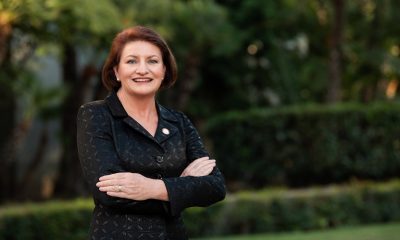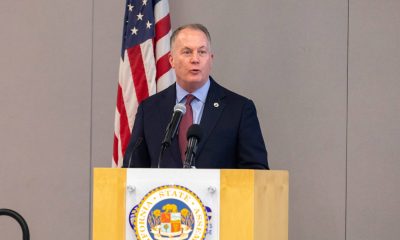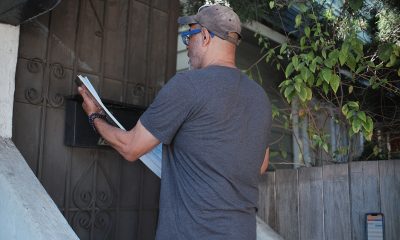Los Angeles
Stonewall to DA Jackie Lacey: Restore trust or resign
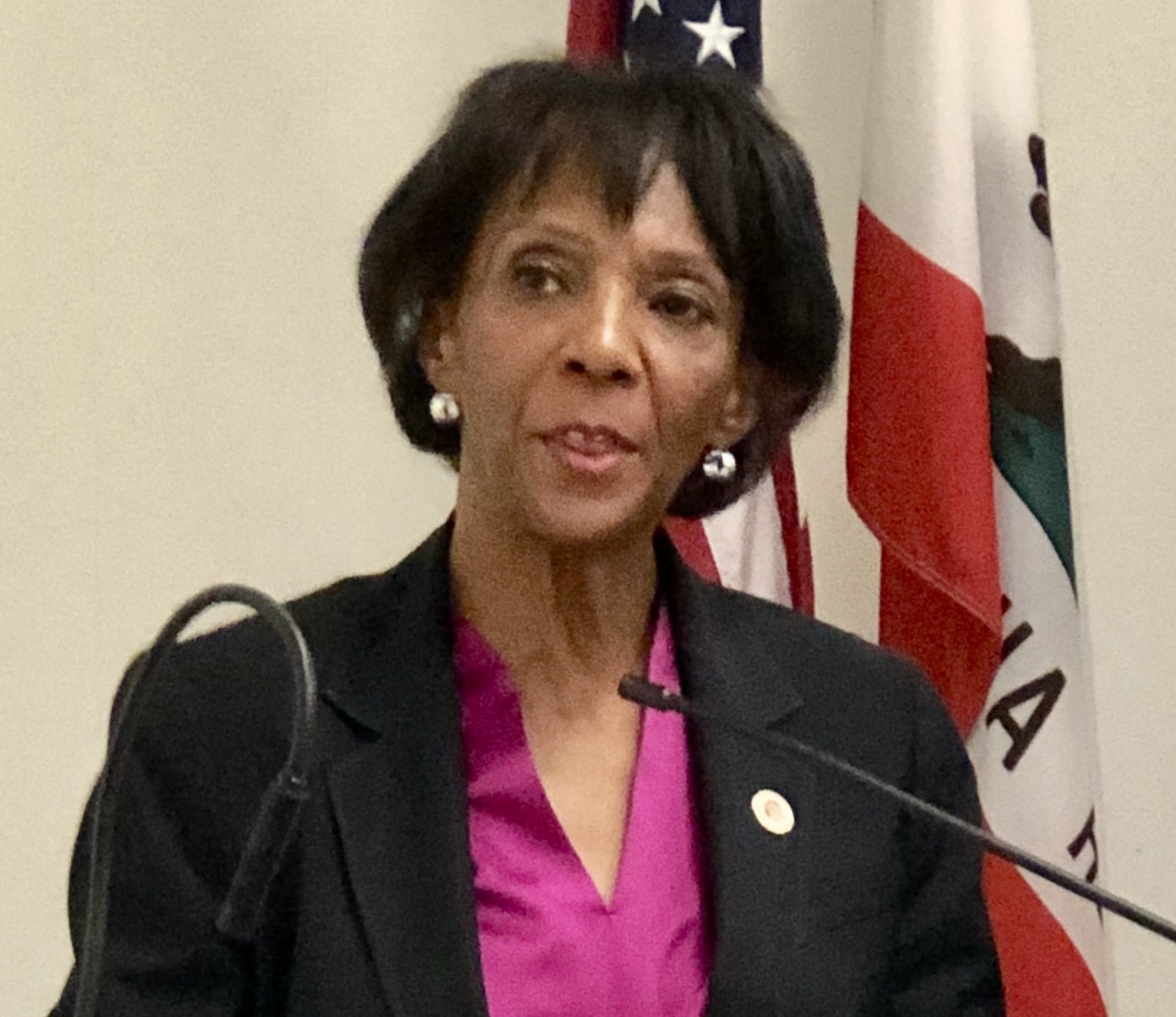
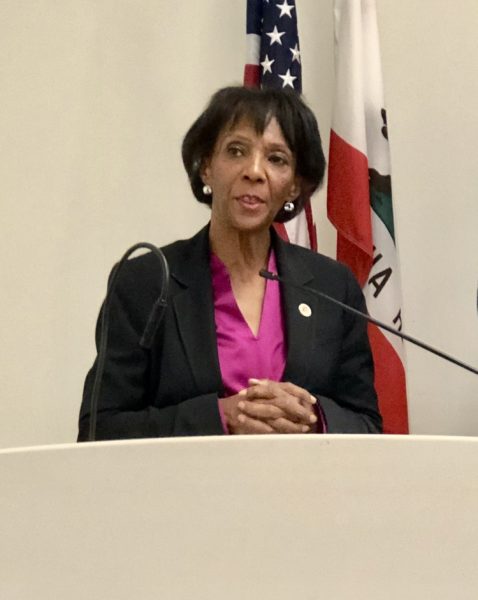
(Editor’s note: This is a different kind of report. The primary election for Los Angeles District Attorney next March is going to be hugely important. I attended the Oct. 28 Stonewall Democratic Club meeting with LA County DA Jackie Lacey in West Hollywood to see how she answered community questions about the notorious Ed Buck case. But Black Lives Matter and family members of young Black men shot by police showed up and confronted Lacey with such raw pain and anguish – to be met by such a cold, logical legal formality – I felt it was important to make a fuller record of the interaction. – Karen Ocamb)
Jackie Lacey was shaking. The District Attorney for Los Angeles County, the largest local prosecutorial office in the nation serving more than 10 million residents over 4,083 square miles, was surrounded by burley bodyguards and scores of Sheriff’s deputies with six squad cars standing by at the West Hollywood Library lest a scuffle broke out with the roughly 20 angry members of Black Lives Matter.
Lacey apparently expected a more traditional, parliamentary rules-driven meeting of the 44-year old Stonewall Democratic Club on Oct. 28. Facing a difficult re-election campaign, the LA DA came to the public political meeting to respond to a scolding Resolution that the LGBTQ-focused club was presenting for a membership vote.
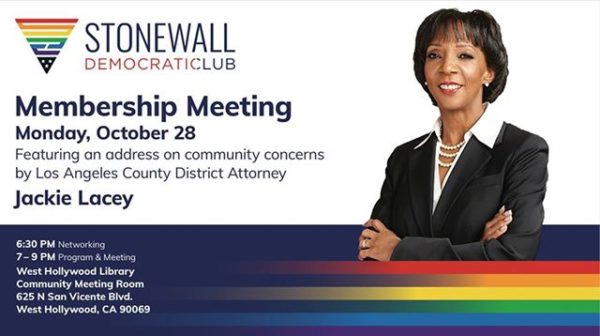
Authored by Stonewall member Jasmyne Cannick, Legislative Action Chair Dr. John Erickson and Political Vice President Jane Wishon, the non-binding Resolution focused on the erosion of trust in the District Attorney’s office after allegations of “racial bias, unfairness, lack of communication, lack of public transparency,” and failure to meet publicly with communities of color; mishandling of the case against West Hollywood resident Ed Buck in the deaths of Gemmel Moore and Timothy Dean; failure to prosecute “police officers and Sheriff’s deputies who use deadly force against unarmed civilians, particularly African-American and Latino people; and for seeking the death penalty despite voters’ rejection and Gov. Newsom issuing a moratorium in March 2019.
Lacey was perhaps unaware that Stonewall stood with Jasmyne Cannick and the families of gay Black victims Gemmel Moore and Timothy Dean as their families painfully expressed frustration and demanded action at numerous news conferences over what appeared to be the favored treatment of white Democratic donor, Ed Buck.
After establishing the caveat that she couldn’t say much because of the ongoing investigations, Lacey opened with an apology.
“I want to say something I should have said a long time ago. I’m sorry, to the Moore family and the Dean family for the loss of their loved ones,” Lacey said, interrupted by cat calls of “too late.”
Lacey tried to explain the required filing criteria in a criminal case. “We have to have legally sufficient and admissible evidence, and we have to have evidence of the identity of the perpetrator, and we have to make sure that the investigation is complete and thorough,” she said. “Finally, after looking at the prosecution’s case, we have to look at not just the evidence proving guilt, but also look at any sort of defense that may be plausible given our evidence. Here is the posture that we found ourselves in the Gemmel Moore case.”
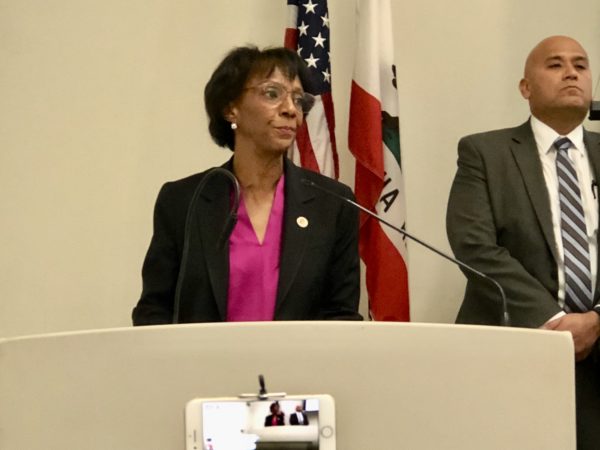
The audience listened respectfully until she mispronounced “Gemmel.”
“Learn his name, that’s basic respect,” said one. “Wow,” said another.
While she appeared nervous before, now Lacey looked as if she was preparing to be pummeled. “Gemmel Moore. I’m sorry,” she said.
Lacey explained that state law required proof that “Buck injected meth” into both Moore and Dean resulting in their deaths. But there were mitigating factors: Buck called 911 and appeared to have attempted to administer aid. “He gave very self-serving statements that could not initially be rebutted by the physical evidence,” she said.
But the primary hinderance to prosecuting a case in Moore’s death on July 27, 2017 was that “the original sheriff’s deputies on the case were not homicide deputies. They were deputies from the station, and at first they treated it as though it were an overdose,” she said, which is what the coroner ruled in both cases – accidental overdose from methamphetamine.
But the deputies noticed a red toolbox they wanted to investigate and a “coroner’s investigator gave them information that turned out to be incorrect” – the misapplication of a government code, which meant they were not able to use the evidence of methamphetamine they found.
“So that presented a challenge and we continued to look for evidence in this case,” Lacey said. “At some point we began to hear that there were more victims of Mr. Buck. However, when those victims were interviewed after being granted immunity, there were things that we couldn’t corroborate because we knew that they were going to be cross-examined about some of the things that they said. For instance, sometimes the victim would say that he received medical treatment at a particular hospital and we would go to that hospital and not be able to get those medical records.”
In another case, Lacey said, “we would have a victim who said, ‘I made a police report,’ and we couldn’t find any record of that police report. It wasn’t until that third credible witness came forward that we caught a break in this case.”
In the meantime, Lacey said, “before that third victim came forward, the federal government, the FBI and the DEA began working with the sheriff’s department to see if they could prove a case under federal law, because under federal law you would not have needed to prove that Buck injected either of these gentlemen. You would just need to prove that he furnished the drugs.”
The third victim was found credible, had information they could corroborate, and was able to testify. That gave the DA sufficient evidence to file charges against Buck.
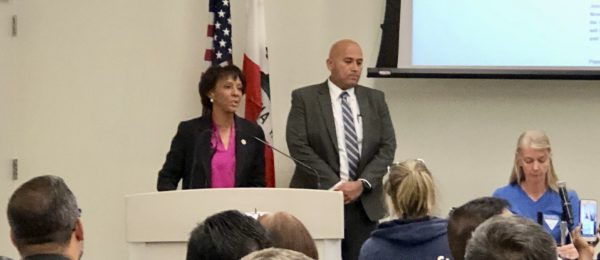
“The charges that we filed were a maximum sentence of five years and eight months and the bail, the maximum bail was going to be four million dollars,” Lacey said. “After searching Mr. Buck’s home and other things during his arrest, we discovered that four million dollars bail, he was able to make that bail, and we did not want him out. About that time the feds decided they would go ahead with their case and they asked us to relinquish Mr. Buck’s body so they could prosecute their case.”
Since federal prosecutors only had to prove that Buck furnished the drugs, not that he injected Moore or Dean and since could charge Buck with 20 years to life, with no bail, Lacey decided to turn Buck over to the feds.
“You will note though that the feds also had problems in the sense that originally in their complaint they said they had 10 victims, but when the grand jury indicted there were only five victims,” Lacey said. “Nevertheless, the case continues, and we are holding our case in the event they are not able to convict Mr. Buck. And that’s where that case stands.”
There were a number of unasked questions, such as what took Lacey so long to talk to the Black and LGBTQ impacted communities after Gemmel Moore’s death. Though the Sheriff’s Department launched several investigations, they failed to share information and only glancingly offered sympathy for Moore’s mother and friends. With the dearth of accurate, fully-explained information, the community relied on the media and stories emerging from others involved with Ed Buck.
Some of those accounts were detailed, such as the coroner’s report in Moore’s death that noted the evidence tainted for prosecutors, including “24 syringes with brown residue, five glass pipes with white residue and burn marks, a plastic straw with possible white residue, clear plastic bags with white powdery residue and a clear plastic bag with a ‘piece of crystal-like substance,’” according to the LA Times.
That Nov. 18, 2017 LA Times story also notes that a notebook had been collected by the coroner, which the paper reviewed. “Ed Buck is the one to thank,” Moore appears to have written, The Times wrote. “He gave me my first injection of chrystal [sic] meth.”
Lacey also made no mention of whether the federal civil rights lawsuit filed against her and LA County by Gemmel Moore’s mother, LaTisha Nixon, played any role in her decision to relinquish the case to federal prosecutors. Nor did she go into more about Buck’s finances regarding that $4 million that he apparently had to make bail and pay attorney Seymour Amster, who vigorously defended his client. Inexplicably, Buck apparently is now being represented by a public defender.
Lacey came prepared to specifically respond to Stonewall’s Resolution but she seemed unprepared for the encounter with angry family members of young Black men shot by law enforcement officers who screamed their agony at her, trying to hold her accountable, trying to get her to listen to them, to commiserate, to share their pain then take action.
In some ways, the Stonewall meeting was reminiscent of the early days of ACT UP when dying protesters or their loved ones screamed at blank-faced government bureaucrats who blandly explained that medications take a very long time to develop. At Stonewall, the Black Lives Matter families of murdered Black men screamed for justice and the prosecution of the officers involved in shooting their unarmed loved ones, calling out their names: Albert Ramon Dorsey. Grechario Mack. Ryan Twyman. Eric Rivera. Lee Jefferson. Christopher Deandre Mitchell.
Stonewall’s Wishon got Lacey to agree to meet publicly with the families and a small group from Black Lives Matter.
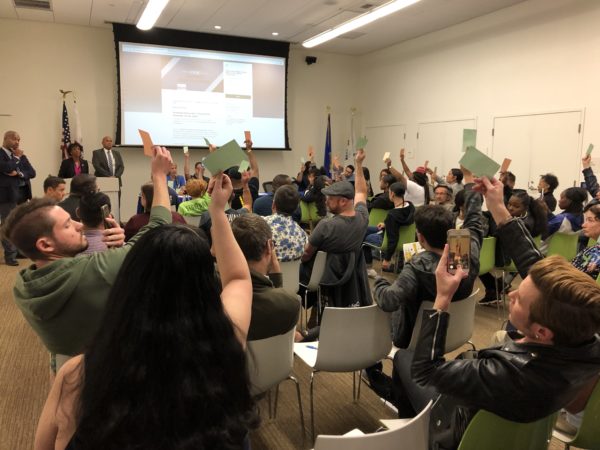
But Stonewall members voted to push Lacey even further in the conclusion of their non-binding Resolution:
“THEREFORE, BE IT RESOLVED that the Stonewall Democratic Club recognizes that Los Angeles County District Attorney Jackie Lacey’s actions and reports of alleged misconduct have eroded the trust of the public, the District Attorney Department’s governmental partners, and this body; we call upon District Attorney Jackie Lacey to take immediate actions to restore trust in her department and to meet publically with members of the black community, indigenous communities and the communities of color before the end of the calendar year or resign; and
BE IT FURTHER RESOLVED this resolution shall be communicated to the members of the County Board of Supervisors and all elected individuals who have endorsed her 2020 re-election campaign,” the resolution reads.
Lacey has agreed to an interview with the Los Angeles Blade next week.
While Lacey has received a lot of notice and bad press around her handling of the Buck case – mentioned by gay veteran Deputy District Attorney Richard Ceballos as one reason he’s challenging her re-election – to most of LA County she appears as a tough-minded, no-nonsense career prosecutor. Even her critics give her props for her work in the area of mental health. A slew of elected officials – including out Supervisor Sheila Kuehl, Assessor Jeff Prang, City Controller Ron Galprin, and Long Beach Mayor Robert Garcia -have already endorsed her re-election on June 2, 2020.
Lacey would seem to be a shoe-in, except Ceballos, out Deputy District Attorney Joseph Iniguez and now former San Francisco city and county DA George Gascon are knocking hard on that door of inevitability.
And then there are the grieving mothers, the members of Black Lives Matter whose cries of “Jackie Lacey must go!” rocked that West Hollywood community room with anger, pain and sense of betrayal.
Lacey was elected in 2015 as LA County’s first woman and first African American DA and has garnered many accolades as a prominent member of the Black community. Honored by the mainstay LA Sentinel for Women’s History Month in March 2017, she told Managing Editor Brandon I. Brooks that after more than 30 years in the prosecutor’s office, she wants her legacy as DA to be “the best.”
“I want them to look at the wall of District Attorneys, I’m number 42, Jackie Robinson’s number,” she told Brooks. “I want them to say, ‘she was the best district attorney we had. We may have not realized it at the time, but she made changes….she was good for the L.A. county.’”
There were moments during the Stonewall meeting when the screaming would subside, as if there was still a modicum of respect for the high achievement made by this Black woman. But with the respect came a sadness, a sense of betrayal that Lacey did not seem to grasp the depth of emotion and despair at the persistent injustice and racism suffered and endured by these women who, it seemed, the top prosecutor with more than 30-years experience would rather just go away.
Lacey addressed the issue of excessive force by police officers and the apparent reluctance to prosecute officer-involved shootings because it was raised in the Stonewall resolution.
Lacey said:
“Since I’ve been DA we have filed cases against 79 officers. They involve on-duty and off-duty conduct. They include everything from wage theft and workers’ compensation to rape and murder. We have filed criminal cases that allege excessive force against 13 officers, including an LAPD officer by the name of Mary O’Callaghan.
We are currently prosecuting the first case filed for an officer-involved shooting in 20 years. These are challenging cases and we have gotten convictions through guilty pleas and guilty verdicts, but some of the cases have resulted in not guilty verdict. These cases are challenging, and these cases are challenging because it is difficult to convict an officer in these cases. We have reviewed the officer-involved shooting cases from 2016, 2017 and 2018. Maybe some of the information I give you-…”
And that’s when the meeting started going off the rails, with family BLM members calling out names – Albert Ramon Dorsey and Grechario Mack killed in 2018.
“Can we please be respectful?” someone asked.
“You be respectful of these families whose loved one’s were killed by police. You shut up,” one leader responded. “To ask families whose loved ones have been killed by police to be polite while she sits here and lies in their faces is asking too much.”
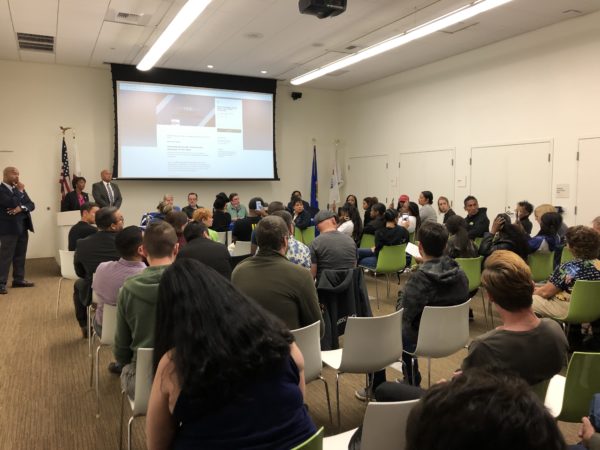
“Justice for Ryan Twyman,” Twyman’s relative yelled as others joined in. “Shot at over 30 times.”
“By your police officers. I know you got that case. Even if it’s not on your desk, I know you’ve seen it, baby. 34 shots,” someone said. “Let’s talk about that. 2019 — but you know, you seen now, you seen it on the news, it hit your desk, you got a phone call. You know about it. Ryan Twyman. Address that.”
“Your Los Angeles sheriff officers who shot Ryan Twyman over 34 times, went back to the car reloading. I’m sure you’ve seen that video. Was that in you all policy and procedure? I think not. That’s how you all train your sheriff’s officers?”
The protesters quieted to let Lacey speak – but she just picked up where she left off.
“In 2016, there were 89 officer-involved shootings. 73 involved a person with a gun, a knife or a simulated weapon,” Lacey said, looking at her notes and just plowing through the presentation. “In 2017 there were 82 officer-involved shootings. 71 involved a person with a gun, a knife or a simulated weapon.”
“What’s a simulated weapon?” someone asked.
“A replica firearm,” Lacey said, barely acknowledging the interruption. “In 2018 there were 63 officer-involved shootings and 50 of them….”
“Eric Rivera,” a protester yelled.
“… involved a person with a gun, a knife and a simulated weapon,” Lacey continued.
“Right, Eric Rivera,” someone said.
“With regard to the officer-involved shootings and in-custody deaths. Since I’ve been DA, we have put up all of the documents, all of the information that we have available, to try to understand what happened,” Lacey said. “I do have sympathy for the families of those who lost people to the hands of police. I do care. I do care. We are doing the absolute best we can, given the state of the law.”
The audience wanted her to discuss the deaths but she trudged on to answer the points raised by the resolution, closing with what seemed to be a pitch for her re-election, given her achievements in office.
“As the proud lawyer, I obtained the first race-based hate crime murder conviction in the state,” she said, urging Stonewall members “not to issue this resolution, but to look at the facts, follow the law and make sure that you have all of the information. The district attorney’s office, though not perfect, and I am not perfect, does an excellent job every day…”
“Is this a mea culpa?” someone asked.
“… of trying to make sure that the right thing is done for the right reasons,” she continued. I have presented you with the facts and I ask you to carefully consider that,” thanking Stonewall for the opportunity to come speak to the group.
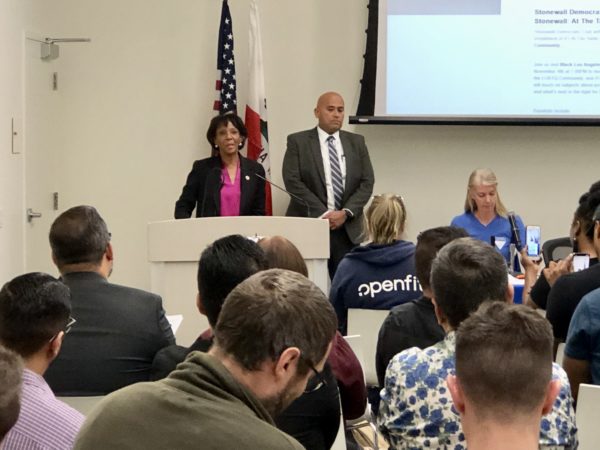
But the audience was not having it, arguing that Lacey has avoided speaking to the Black community.
“We have asked you for two years,” the BLM leader said, “to speak to the black community and you’ve run from us. We had to come all the way — more than half of this audience is Black people from South LA, from Compton, from Inglewood, who had to come all the way out here for you to face us. You told me directly you were afraid that we would yell at you. You signed up to be yelled at. That’s what your job is. You are an elected official and you are shushing people who are the families of people who’ve been killed by police that you refuse to prosecute. Lee Jefferson. How long ago was Lee killed?”
“The day before Thanksgiving, 2011, when officers riddled my son with bullets. 23 years old,” said Stephanie Jefferson.
The room hushed for a moment. Then, as Wishon tried to asked submitted questions, the tone got dark. Not aggressive, no hint of violence – but dark, pain deepened by too many long days of having been neglected.
“It’s racism that you come here and not to black communities. That’s racism. You are a black face on white supremacy. And you should ashamed of yourself,” said one protester.
“You know you see us outside your office on Wednesdays,” said another.“You need to address that. That’s not cool while these people are out here every single Wednesday, at your office because we want to know why our families are being murdered and you’re not arresting these officers?”
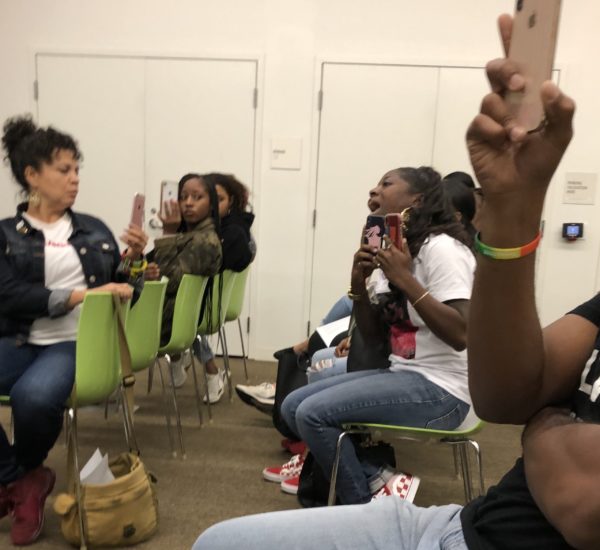
“I am here to restate Ryan Twyman was murdered for no reason. 34 shots, opened the back door. Assault rifles. That don’t make no sense. And you’re not going to address it. You’re not going to prosecute nobody. You’re not going to do nothing about it. You just going to stand up there and act like that’s not a problem. Like your sheriff is supposed to be doing that. That is not a policy and procedure,” said the leader, a relative of Ryan Twyman.
Some Stonewall members pushed back, saying this was not BLM’s meeting and they were disrespecting everyone else.
“Not trying to disrespect her,” the leader said. “In our defense, we’ve been trying to talk to her for a very long time. Sir, I understand where you’re coming from, and we’re not trying to disrespect your meeting, but this is our first time being able to see her and address her with our problems. That we have a problem. This is some serious shit.”
“Okay. I regret that I walked out of the town hall two years ago. I should have stayed and listened,” Lacey said. “And prior to that I had been meeting with groups in the community, and I must admit that back then I wish I had stayed. I don’t know whether it would have changed anything.”
“We gave you chances to do it again and you refused,” said a protester.
What I want is a dialogue. That’s all I’m asking for. I will listen, you can scream,” said Lacey, trailing off. “I am regularly in the black community.”
“Not in an open meeting,” said Twyman’s relative. “Stop lying. We offered you, we asked you for a forum and a dialogue two years ago. You called me. I still have the text messages. And the voicemails.”
“I am willing to meet, as long as we can sit down and have a dialogue. That’s all I’m asking,” Lacey said.
“You’re asking families to be polite to you,” said the leader.
“The last time we met I was not given an opportunity. I felt I was never…,” Lacey said.
“My brother wasn’t given a opportunity…..,” said the protester.
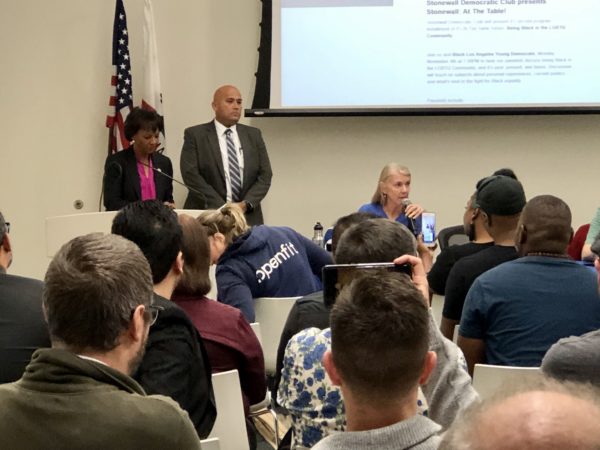
Lacey answered questions posed by Wishon with continued interruptions and comments. But it all came back to Lacey meeting with members of the Black community, perhaps at a public meeting hosted by a Democratic club in South LA.
Lacey agreed. Then she seemed to posit qualifications. “I want to make this offer one more time. Any victim — anyone who has had someone who has died in the hands of police, I’m making that offer. I’m willing to meet with individual families privately. I’m making that offer,” she said.
“No,” said a protester as another argued against a private meeting.
“Obviously you’re saying, ‘No thank you,’” Lacey said with a flash of snark.
“My brother was killed on the news. My kids are going to see that video,” argued a protester, to which Lacey replied that she didn’t put the video there.
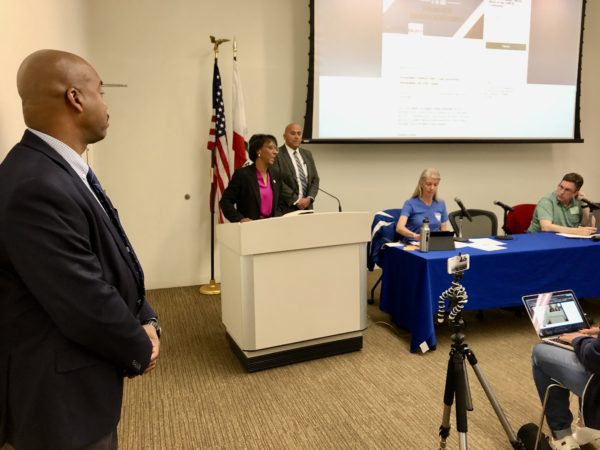
After more back and forth, Lacey made another concession. “All right. I will meet with families privately and I will also meet with Black Lives Matter, but I want it to be a smaller group,” Lacey said.
The group insisted on a totally public meeting.
And then came this question: “When there is a situation with a civilian and officers are called, why are family members not allowed to help de-escalate the situation? Why are they kept away? And sometimes this turns into a big shooting.
“Only the police can answer that. I am not there when the shooting occurs and so I don’t think it’s right for me to give whatever the reasons are with regard to why that’s happening,” Lacey said.
“But you investigated. You signed off on it. So how come you can’t answer it? You investigated, you signed off. It’s your signature on the paperwork,” said the leader.
“We are not the lead investigating officers. We send our officers out there to look over…,” Lacey said before being interrupted. “The lead investigator are the internal affairs investigators who do the actual investigations. We have investigators, one investigator, one prosecutor, who show up at every officer-involved shooting and some in-custody deaths. We are not the lead agency in that particular matter.”
Lacey was explaining herself from the position of having spent 30 years in the prosecutor’s office.
Stephanie Jefferson, the mother of Lee Jefferson, responded with a mother’s eviscerated heart:
“I mean when it’s going down, when they had my son in that house, in the back house, hiding — how come they didn’t let his grandmother on that phone to talk to him? I was on my way there. He was killed less than an hour before I could even just talk to him. His grandmother was standing outside. Nobody could talk to him. They wouldn’t let no one talk to my son. They killed him. Murdered him…
They riddled him with bullets. 23 years old. You still have Kareem at home. I don’t have my son at home. You still have April. I don’t have that. He’s gone. Every day I have to live with this. I have to tell his daughter. His daughter knows the police killed him. His sisters know that. He has a lot of family. He has a lot of friends and he has a lot of people that love him. They tried to criminalize my son after the fact, to justify it, because they said he was a gang member. He didn’t ask to be killed…..
What is the negotiation tactic? There was no robot. There’s no tear gas to try to get him out if he posed a threat. How can someone pose a threat if they’re hiding?”
“I can’t disagree with you. I wasn’t there,” said Lacey.
“Well, if you can’t disagree, then why would you sign off? Why would you say that they were justified because he posed a threat to the public,” said Stephanie Jefferson. “He did not pose a threat to the public.”
“You were asking me about the tactics. I’m not going to argue with anyone who lost their son. I’m not,” Lacey said.
“You can’t. And you know what else they did? They also handcuffed him after he’s dead, with shots in his eyes and his heart, all over his body. How can he be handcuffed and his back be bruised from them stepping on him? Why step on a dead body?” Jefferson said. “Why did the detective have to be at the coroner’s office when they do the autopsy? They know why he died. They know what bullet hit him. He got shot 14 times. Eight of those shots were fatal. The day before Thanksgiving.”
“So how can officers found out of policy not be held accountable for murder?” Wishon asked.
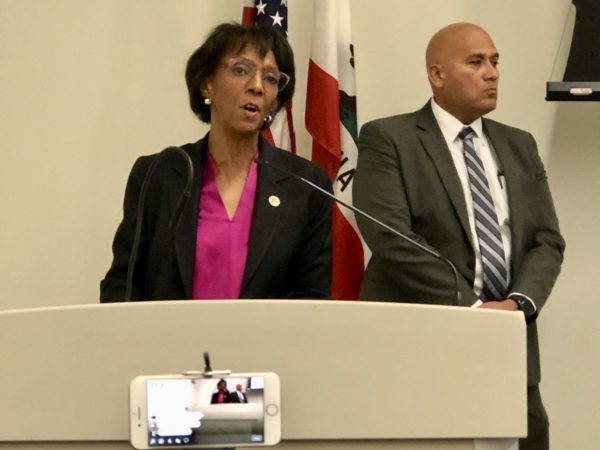
Lacey said:
“Out of policy is different from criminal liability. With regard to out of policy, the standard of proof for out of policy is much lower than for criminal behavior. With regard to criminal behavior, we have to prove beyond a reasonable doubt with evidence that the person is guilty of a crime. And so oftentimes, it is not unusual for someone to find that it’s out of policy but we may not be able to prove that the officer committed murder or manslaughter.
And that’s the difference. And there’s a lot of confusion about that. I can understand where the confusion comes from, but that’s the difference between out of policy and criminal behavior. With criminal, you have to be able to prove beyond a reasonable doubt that someone is guilty.”
But the officers, were “working the next day. Like come on Jackie, make this make sense, because you’re not making it make sense,” the leaders noted. “If this was your child, I would be doing the same thing in representation for you….We families out here, and we hurting.”
“You a cold, cold lady,” said one protester as the meeting was winding down. “I don’t know what’s wrong with you.”
Lacey left shortly after Stonewall passed the resolution. None of the protesters followed her or tried to impede her path.
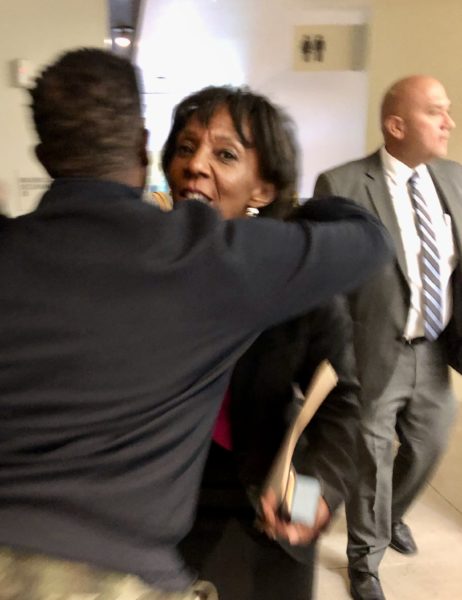
As she entered In the back of the room and outside when she left, Lacey was greeted by supporters, including longtime gay Democrat Ari Ruiz. The DA looked shaken, worn out, as if still grappling with why the rude protesters refused to give her the respect and deference usually afforded a woman of her station. Her demeanor seemed to say: If only they would let her explain how the law works. If only they realized that I really do care.
Inside, Cannick and other Stonewall members were shocked at how “disconnected” Lacey seemed from the community and the pain. Cannick said they intended to take the resolution to all the elected officials who’ve endorsed her for them to reconsider what seems like elected automatically endorsing another elected.
“Part of our approach at Stonewall is to hold our elected officials accountable – we endorse candidates who we believe will uphold our values of equality, justice, fairness, and respect for all. We are not a rubber stamp for incumbents who have not upheld those values,” Wishon told the Los Angeles Blade.
After looking at both the LA County Sheriff and the LA County DA and how their offices interact with the LGBTQ community and the greater LA County communities, “we found that we had questions and there seemed to be issues that ran counter to those values,” she said.
Stonewall wrote resolutions “calling upon the elected official to increase transparency, improve communication with the community, and restore the trust that had been lost,” and asked the elected to address those concerns. Both resolutions passed, but in the Sheriff’s case, the resolution was toned down while in Lacey’s case, the amendments asked her for action or to resign.
Wishon said this about the Stonewall meeting she facilitated:
“The pain and grief of the families who have lost their loved ones to officer-involved shootings was nearly overwhelming. Before the meeting I asked to be introduced to all the families – their pain is unimaginable for me, as a Mother. And their pain sometimes took verbal form – crying out to the DA for help in making sense of what had happened. They had serious questions, unanswerable questions at times, about why this had happened to their loved ones and why there was no justice.
For me, it was difficult to witness such raw pain and I felt it important to respect their grief and their loss by allowing them to express it. At the same time, we needed to hear the DA’s answers so it was a delicate balance between allowing the family members to speak and asking them to hold while the DA answered their questions. I do think it helped that we had the audience write questions that I read – I heard more than one family member say “That’s my question” with some pride and I hope it also brought some small bit of closure to them to hear their questions and concerns taken seriously by the Club and the DA.
The process last night was entirely separate from the endorsement process by intention. We will take up the DA race in January 2020.”
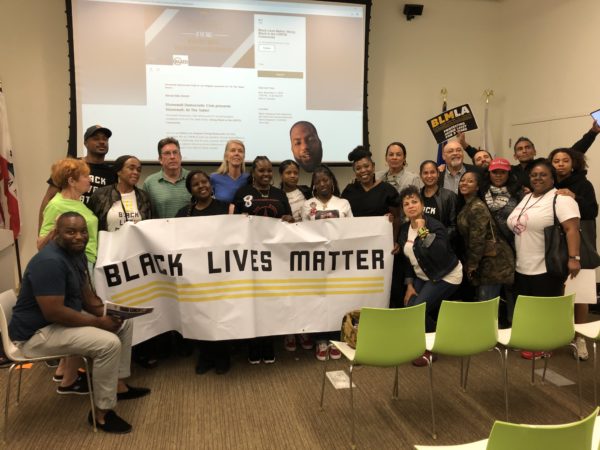
The Stonewall Resolution:
DISTRICT ATTORNEY JACKIE LACEY NEEDS TO RESTORE COMMUNITY TRUST IN HER DEPARTMENT
WHEREAS The Stonewall Democratic Club holds the elected officials we have endorsed to high standards in keeping with our values of equality and justice yet the trust in Los Angeles County District Attorney Jackie Lacey’s department has been eroded by allegations of racial bias, unfairness, lack of communication, lack of public transparency and has failed to meet publically with members of the black community, indigenous communities and the communities of color; and
WHEREAS Jackie Lacey allegedly has mishandled and refused to press charges against Democratic donor Ed Buck for the 2017 death of Gemmel Moore and the 2019 death of Timothy Dean in Buck’s apartment claiming insufficient evidence. She has repeatedly refused to take a tougher stance in prosecuting police officers and Sheriff deputies who use deadly force against unarmed civilians, particularly African-American and Latino people. Her office has not filed charges against an officer in an on-duty shooting in more than 15 years; and
WHEREAS voters in her constituency, Los Angeles County, have repeatedly rejected the death penalty at the ballot box and California Governor Gavin Newsom issued a moratorium on the death penalty in March of 2019, putting a halt to all executions under his watch. Yet District Attorney Jackie Lacey’s office has continued to seek the death penalty in capital trials sending 22 people to death row, every single one of the 22 people was a person of color.
THEREFORE, BE IT RESOLVED that the Stonewall Democratic Club recognizes that Los Angeles County District Attorney Jackie Lacey’s actions and reports of alleged misconduct have eroded the trust of the public, the District Attorney Department’s governmental partners, and this body; we call upon District Attorney Jackie Lacey to take immediate actions to restore trust in her department and to meet publically with members of the black community, indigenous communities and the communities of color before the end of the calendar year or resign; and
BE IT FURTHER RESOLVED this resolution shall be communicated to the members of the County Board of Supervisors and all elected individuals who have endorsed her 2020 re-election campaign.
Authored by
Jasmyne Cannick, Member, Stonewall Democratic Club
Dr. John Erickson, Legislative Action Chair, Stonewall Democratic Club Jane Wishon, Political Vice PresidentAdopted October 28, 2019
Los Angeles
Nikko LaMere’s photo exhibit “JOY!” documents the euphoria of Black queer nightlife
Now available to view at the LA LGBT Center, “JOY!” is a raw preservation of Black queer nightlife, fantasy and self-discovery.

It’s 2018, inside queer dance party Ostbahnhof, and the floor is packed with a sweaty, hypnotic energy as people groove to the sexy, lush soundscapes of techno and deep house. Photographer and visual artist Nikko Lamere rushes to grab their disposable camera, accidentally spilling some of their whiskey ginger on someone, and snaps a couple of shots of their friends: immortalizing their uninhibited joy and movement forever.
Eight years later, these photos LaMere captured across various local queer dance parties comprise their newest and largest photo exhibition yet: “JOY!” Displayed at the Los Angeles LGBT Center, “JOY!” is a raw documentation of Black queer nightlife, fantasy, and euphoria. It includes two of LaMere’s major bodies of work and follows the artist’s queer journey and creative evolution.

The exhibit’s opening on Feb. 13 is one of two events in the Center’s “Highly Favored” programming series that uplifts Black queer liberation every February. The next event comes this Saturday, and is a celebratory dance party akin to the ones documented in LaMere’s photos.
Prior to this exhibit, LaMere was most known for their saturated and stylized editorial work with contemporary music phenoms like Doja Cat, SZA, Latto, Billie Eilish and Kehlani. Propelled at a young age into flashy spaces with modern-day tastemakers and legends, LaMere sought refuge in photography throughout their adolescence. Their fascination with the camera began in elementary school while growing up in Culver City, when their grandmother gifted them a Nickelodeon-themed camera to take photos with.
Their eye and talent were reinforced with praise, and this love for the craft grew from curiosity to solace in high school. Bullied for being gay and femme, LaMere sought refuge at the library, where they first discovered the technicolor, surreal work of visionary photographer David LaChapelle. This became a direct pathway for LaMere’s own career: one that, though successful and fulfilling in its own way, led to a need for change.
For so long, the camera was a means to fulfill someone else’s vision. Now, LaMere began to use it as a tool for connection and raw documentation. In 2018, they didn’t set out to create what is now their “In the Night” photo series; they were simply trying to explore their own queer journey, and preserve the friendships and environments that made them feel comfortable in their own skin.
That vulnerable process of “becoming” is one they hadn’t touched upon in their previous work. For the first time, they couldn’t carefully and methodically create the shot; whatever they snapped was based purely on instinct, a fleeting moment of true and embodied tenderness, ecstasy, and freedom.
“To have this body of work shot all in black-and-white, for it to be so gay and Black — it feels really affirming,” LaMere said. “These are the most raw images and things I could create. There’s no Photoshop. There’s no retouching. It’s literally straight from the camera. It just is. I think part of joy is being able to just be, and that’s what these images are.”

“JOY!” also includes LaMere’s work, “Queer Fantasy,” a collection of 40 black-and-white film portraits and interviews with local queer performers, artists, and everyday people. This newer project grew from the core of “In the Night,” and is another intentional project focused on highlighting the beauty and individuality of queer Angelenos. Each person is asked: “What is your queer fantasy?,” illustrating that queer fantasy is not only a transformative kind of rebirth: it is a process built by radical efforts to cultivate joy, success, and safety in the face of violence and discrimination.
For LaMere, “JOY!” is about this process and the moments of self-discovery found on the dance floor, where you can really feel tethered to the person you’re becoming while “the world is burning around you.” While speaking with LaMere, I am grounded by the words of DJ, artist and organizer Darryl DeAngelo Terrell.
“Here, in this space we as black people [are] forced to find liberation in our own bodies, it’s in us, deeper than melanin, and it is activated by bodily acts,” Terrell writes. “We Move* in ways that others can not fathom to understand. Through these acts, we find the most beautiful yet temporary forms of true freedom; we find joy, peace in these acts.”
“JOY!” is available to the public on Wednesdays and Thursdays from 11 a.m. to 4 p.m. More information about the exhibit and “Highly Favored” can be found here. This Saturday’s queer dance party will also honor special guests Hailie Sahar, a starlet on the revolutionary FX show Pose, as well as filmmaker and ballroom culture documentarian Elegance Bratton.
Kristie Song is a California Local News Fellow placed with the Los Angeles Blade. The California Local News Fellowship is a state-funded initiative to support and strengthen local news reporting. Learn more about it at fellowships.journalism.berkeley.edu/cafellows.
Los Angeles
A new “queer summer camp” cycling event rises from the legacy of AIDS/LifeCycle
The LA LGBT Center will host its first ever “Center Ride Out,” a 3-day community cycling adventure from Los Angeles to San Diego.

On April 24, 500 cyclists will meet at Elysian Park before dawn, stretching and preparing for a 110-mile ride through urban scenery and rolling hills. They will be part of the Los Angeles LGBT Center’s inaugural “Center Ride Out,” a 3-day journey that takes riders through Los Angeles and Temecula, reeling to a stop at the San Diego LGBT Community Center.
The cycling adventure is a rejuvenating, communal queer experience that taps into the importance of shared joy and advocacy in the fight to defend LGBTQ+ rights. Its roots are sacred for many queer elders: Center Ride Out rises from the legacy of the cherished AIDS/Life Cycle (ALC), a seven-day cycling adventure from San Francisco to L.A. that formed in 1994 and ended with its last ride in 2025.
In its 31-year run, ALC riders raised over $300 million for HIV and AIDS resources, services, and awareness. This year, Center Ride Out provides a new, exciting extension of this important event, allowing cyclers to raise funds in support of the LA LGBT Center, The San Diego LGBT Community Center, and the LGBTQ Community Center of the Desert.
This support is crucial as LGBTQ+ organizations face a new crisis: widespread defunding. In the last fiscal year, the LA LGBT Center lost $9 million in federal support, according to its CEO Joe Hollendoner. The funding raised by Center Ride Out’s participants will help offset this loss and keep the organization’s various programs and services, from gender affirming care and HIV prevention resources to LGBTQ+ senior and youth support, afloat. “We anticipate further divestment in our work by the Trump administration, [so Center Ride Out] allows people to align their own personal passions with our mission in a broader way,” Hollendoner told the Blade.
Altogether, Center Ride Out participants will cover nearly 200 miles of ground together. At the end of the first 110-mile day from L.A. to Temecula, where riders will get to look at historic landmarks and embark on a museum lunch stop together, the day culminates at campgrounds at Lake Skinner.
Here, riders can take a full rest day at their lakeside camp, where it will exude queer summer camp vibes. There will be massage and medical services, arts and crafts activities, dance parties, and time to relax and connect with the community. “Folks [can] build relationships, have some fun, and feel safe. That’s a feeling a lot of people [need] right now, especially our trans and nonbinary siblings,” Hollendoner said.
Day 3 ends with an 87-mile downhill, coastal ride through the town of Rainbow in northern San Diego County, before ending with a celebratory bash at the San Diego LGBT Community Center.
Hollendoner rode ALC five times while it was active and is excited to be part of this new legacy from its very beginning. “I’ve heard our community elders talk about how powerful it was to be at the start of AIDS/LifeCycle, and the idea that I can be here at the start of Center Ride Out, an event that I hope will go for three decades or longer…It feels really exciting to me,” Hollendoner said.
For newcomers and experienced cyclists alike, Center Ride Out aims to provide an accessible experience: paring down the initial weeklong ALC ride to three days. To take part, cyclists are expected to raise $2,500 by April 10. For those who may struggle to reach this minimum, staff members have established a community fund.
The community fund will also provide scholarships for BIPOC, trans, women, and femme participants — historically underrepresented communities at ALC — as well as microgrants for BIPOC and trans-led teams to encourage a diverse range of cyclists.
Come April, scores of queer cyclists will get to experience this adventure together: one that is both storied and fresh in its purpose, lineage, and joyful expression of queer togetherness. “Center Ride Out is providing an exciting opportunity for people to not only fight back and be in community with one another, but to build resiliency and be surrounded by people who share values around liberation,” Hollendoner said.
To learn how to register, donate to or volunteer for Center Ride Out, more information can be found here. The three-day adventure takes place from April 24 to April 26.
Kristie Song is a California Local News Fellow placed with the Los Angeles Blade. The California Local News Fellowship is a state-funded initiative to support and strengthen local news reporting. Learn more about it at fellowships.journalism.berkeley.edu/cafellows.
Los Angeles
Stonewall Young Democrats bounces back from “quiet year” with Hero Awards

On Saturday, Feb. 7, the Stonewall Young Democrats (SYD), an organization that mobilizes and fosters community for young, LGBTQ+ people, hosted its “Hero Awards” ceremony at Beaches West Hollywood. Under luminous pink light, vibrant crowds of community members showed up to support and celebrate people and organizations spearheading LGBTQ+ visibility, change, and livelihood across L.A. County. Political figures filled the venue wall to wall, including LA Mayor Karen Bass, West Hollywood Mayor John Heilman, West Hollywood Council Member John Erickson, and California Assemblymember Rick Zbur.

Several local advocates and politicians were honored for their queer advocacy and leadership, including City of Los Angeles LGBTQ+ community affairs liaison Carla Ibarra, L.A. Democratic Party Chair Mark Ramos, Congressman Mark Takano, and L.A. County LGBTQ Commission Chair Sydney Rogers. The Los Angeles Blade was also recognized with an Impact Award.
Los Angeles Blade publisher Alexander Rodriguez accepted the award. In his acceptance speech, Rodriguez shared, “We report on and share the struggles of our queer community. We also get to see the resilience and strength our community has, even in the face of adversity. We see firsthand the importance of the Stonewall Young Democrats and the amazing network of people they have put together, as seen here today.”

The Stonewall Young Democrats formed in 2004, immortalizing the 1969 Stonewall riots in its name. The decision to carry the legacies of early gay rights movements is poignant: queer resistance and their enduring battle against political and social marginalization and violence are seared into the organization’s core.
SYD’s President Kanin Pruter is keeping this link to the past alive; it’s a reminder of the interconnectedness of the queer community. “Our history is there for a reason,” Pruter told the Blade. “Without lesbians during the AIDS crisis, we would not be where we are today. And our movement was started by Black trans women.”
This recent Hero Awards marks SYD’s revitalization. After a relatively quiet year, its board is excited to grow its organization, recruit diverse and eager LGBTQ+ folks, and create fruitful opportunities for everyone in the organization to develop their political advocacy and organizing skills.

Most importantly, Pruter hopes that SYD can be a safe, inclusive, and accessible space for any LGBTQ+ person who has felt outcast before. “In a loving and joking way, we’re an island of misfit toys,” Pruter said, who is intentional about creating environments where queer folks who have experienced trauma, isolation, and exclusionary social politics can fit in and belong.
“I want folks to be open, vulnerable and leave any preconceived notions at the door. We come in here [and] we are who we are. We respect each other’s identity, and we’re here to foster a culture where everyone feels welcome.”
Pruter encourages young LGBTQ+ people who are interested in getting involved in SYD, to contact him and learn more about the organization. More information can be found here.
Kristie Song is a California Local News Fellow placed with the Los Angeles Blade. The California Local News Fellowship is a state-funded initiative to support and strengthen local news reporting. Learn more about it at fellowships.journalism.berkeley.edu/cafellows.
Los Angeles
Project Angel Food is now able to feed 10,000 people daily with expanded building
On Thursday, community gathered to celebrate Project Angel Food’s new kitchen and campus building, which allows them to serve more of the county’s critically ill community.
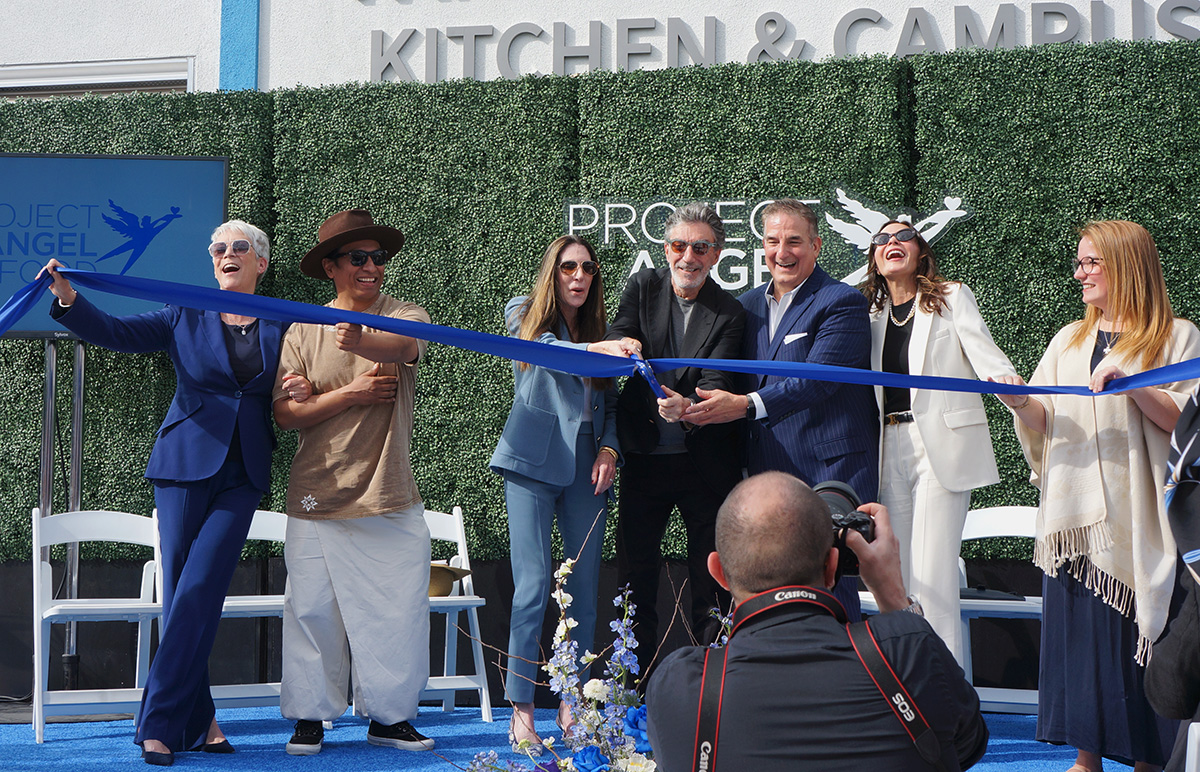
On Feb. 5, community members gathered at 922 Vine Street to celebrate the expansion of Hollywood-based non-profit Project Angel Food. That Thursday morning, the organization cut the ribbon for its Chuck Lorre Family Foundation Kitchen and Campus: one of two new buildings that greatly increase its capacity to provide healthy food and nutritional resources to the county’s critically ill community members.

Project Angel Food was founded in 1989 by author and activist Marianne Williamson and blossomed from a dire need to feed people impacted by HIV/AIDS during the epidemic. Today, the organization cooks and delivers over 1.5 million meals, tailored to specific needs that include chronic illnesses and gastrointestinal issues, to 5,000 people across Los Angeles.
In August 2023, the organization launched its “Rise to the Challenge” campaign, a multi-year expansion and renovation project backed by $51 million. Now, its first phase is complete, and its impact is expected to double.
With the new Chuck Lorre Family Foundation Kitchen and Campus, Project Angel Food’s kitchen staff — which, like the rest of the organization, is majorly powered by volunteers — has access to 16,000 square feet of expanded space, which includes more ovens, walk-in freezers, and hot cook lines than they’ve ever had access to previously. Project Angel Food CEO Richard Ayoub explained today that this will allow staff and volunteers to serve 10,000 people a day.
The organization’s executive chef, John Gordon, explained to the Blade that “space issues” were a major hindrance previously. Before the new kitchen was opened, staff worked out of a much smaller Lincoln Heights facility. “If you didn’t get the rack, you don’t have the sheet pans. If you got the sheet pans, you don’t have the last chiller,” Gordon said, explaining how difficult it was before to balance multiple tasks in the same space. Now, their team of seven chefs, 12 kitchen assistants, dishwashers, and volunteers can work in several cook lines at the same time.
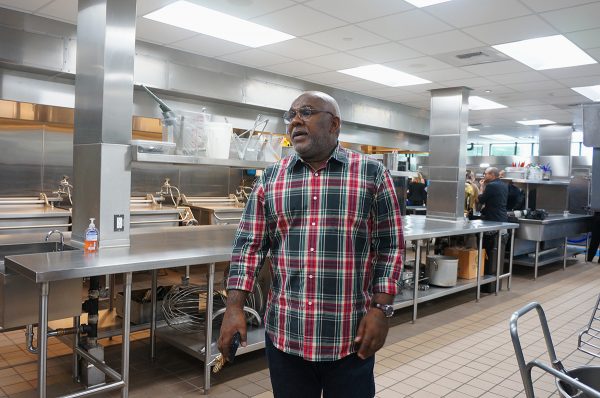
“We’re much more efficient this way,” Gordon continued. In the kitchen, the day begins at 8 a.m. Someone will pick music for the morning, setting a groove for staff as they sync up to review recipes, pack meals prepared from the day before, and cook meals for the next day ahead. After a lunch break, they continue to work until 4 p.m. to make sure they’re meeting the needs of the community they serve.
For locals like Celeste, a Project Angel Food client who is affected by multiple sclerosis, this service is crucial. On days the disability “really takes effect,” being able to receive nutritious meals customized to her needs makes a meaningful difference. “Some days, I’m not able to get up,” Celeste said. “Just that one meal [can] give me an extra boost [and] allow that sun to shine brightly even on my rainy days.”
For advocates and Project Angel Food supporters, Thursday’s celebration was also an act of resistance and a bold declaration against the federal administration. Jamie Lee Curtis, the honorary co-chair of the “Rise to the Challenge” campaign, spoke of the “love” that lay at the core of Project Angel Food’s foundation: a kind of love she finds completely absent in the federal administration.
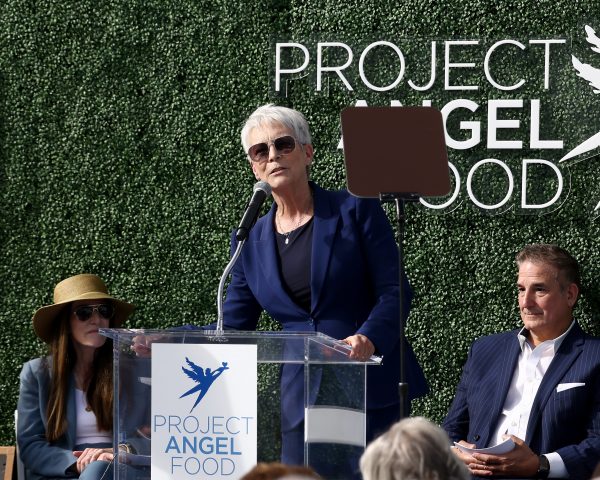
“We are a community here today the same way they are in Minnesota, and I feel like what they’re doing is what we’re doing,” Curtis said to the crowd, defiance firm in her voice. “And we’re only going to get any shit done if we do it together and defy these motherfuckers.”
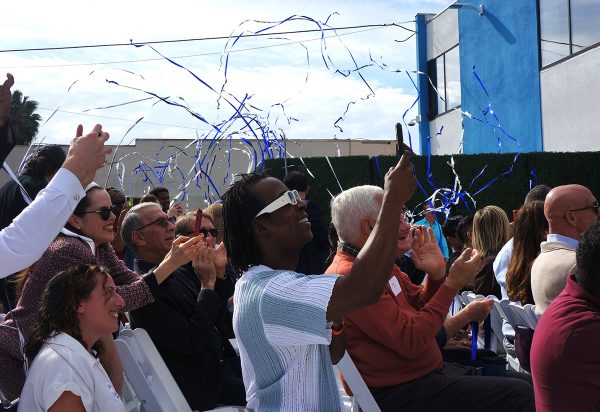
County supervisor Lindsey Horvath, a former delivery volunteer at Project Angel Food, affirmed this statement and guaranteed the county’s continued support in the organization. Horvath spoke of the government’s “glaring absence” during the HIV/AIDS epidemic: one that is “eerily similar” to its attitude now.
As the government mobilizes Immigration and Customs Enforcement (ICE) agents, sending immigrant communities spiraling into crisis, on-the-ground organizations like Project Angel Food are standing in firm support of their marginalized and ill community members. Horvath’s confirmation of county support is also rooted in this mission.
The building’s exterior also reflects the organization’s dedication to its residents. On the south side, a new large-scale mural painted by esteemed local muralist Robert Vargas highlights the stories of local volunteers and vendors who live and work in the neighborhood. Vargas explained that seeing these people in action “crystallized” the dedicated service and harmony that exists among the organization’s volunteers, clients, staff, and nearby community members.
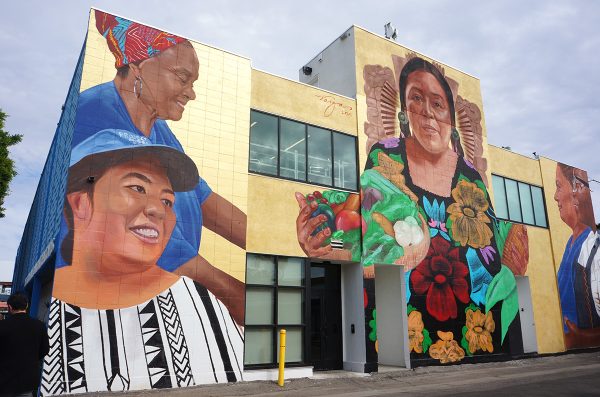
Next, the second building of the Chuck Lorre Family Foundation Kitchen and Campus begins construction this summer. This space will house the organization’s nutrition, volunteer, and client services and will also include its first department dedicated to research and policy. There will also be a training kitchen, where clients will be able to learn how to cook meals on their own.
As Project Angel Food’s growth continues, Ayoub hopes community members who are able to pitch in will do so. While public funding can feel unsteady, he explained, community strength and sustainment can fill those gaps of doubt. The organization is $2.3 million away from its goal in securing capital for this second building, and Lorre will match donations up to $1.5 million.
Kristie Song is a California Local News Fellow placed with the Los Angeles Blade. The California Local News Fellowship is a state-funded initiative to support and strengthen local news reporting. Learn more about it at fellowships.journalism.berkeley.edu/cafellows.
Los Angeles
Community members urge city council to invest in trans lives
Advocates introduced the TGI Wellness and Equity Initiative, a campaign that would direct crucial funding to trans, gender expansive and intersex community organizations.
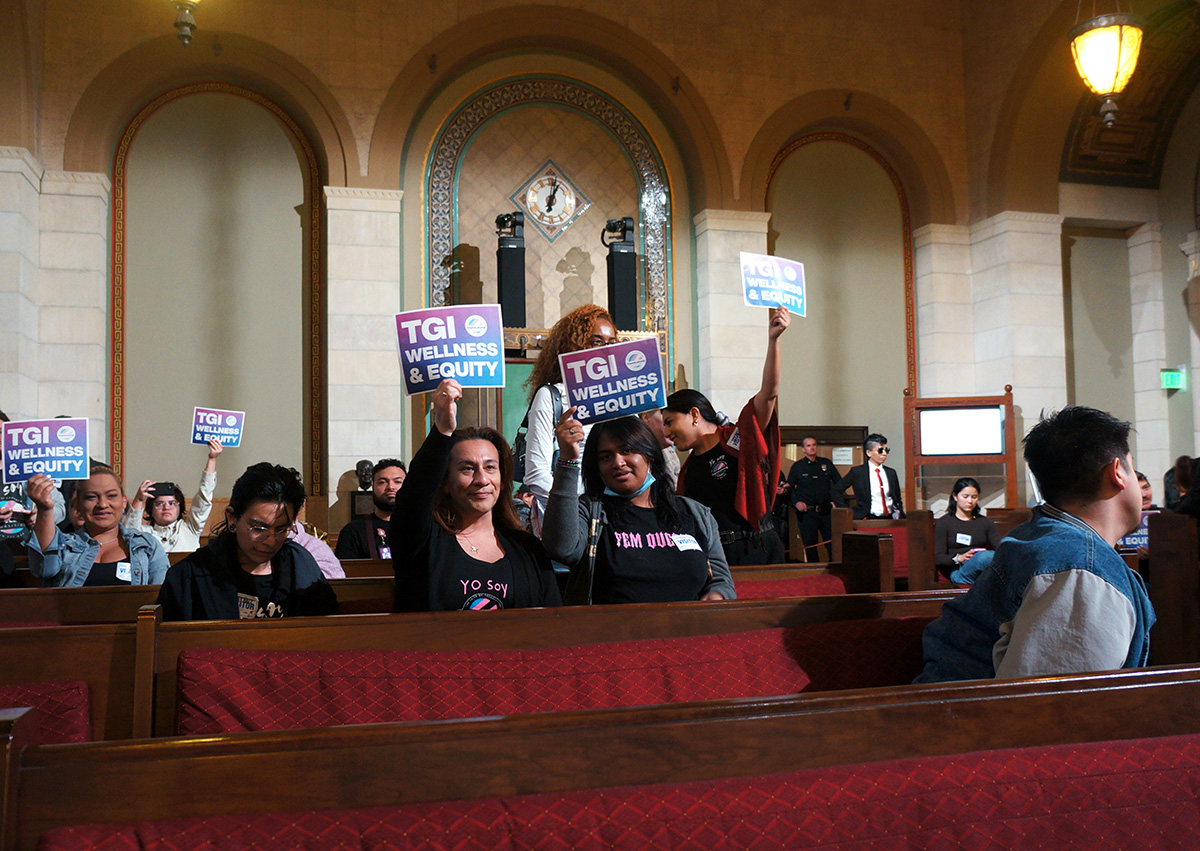
At 9 a.m. on Tuesday, ahead of L.A.’s regular city council meeting, a long procession of people wrapped around the entrance leading into the council chamber. Someone remarked that it was “unprecedented” to see so many people gathered, waiting to get inside. Several housing advocates and legal experts were waiting to make public comments about Measure ULA, otherwise known as the county’s “mansion tax.”
Another fifty or so transgender, gender expansive and intersex (TGI) advocates from the TransLatin@ Coalition (TLC), a long-standing organization that provides housing and meal support, legal services, mental health guidance and peer support groups, showed up to demand real, tangible support on behalf of themselves and their community members as the Mayor prepares the city’s budget on how funds will be allocated.
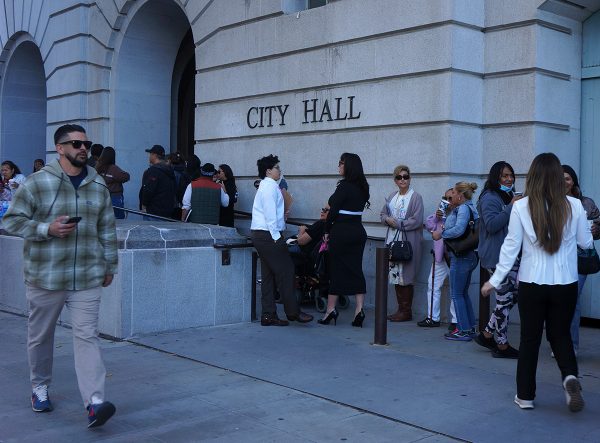
TLC advocates called on the city council to invest in their TGI Wellness and Equity Initiative (TGI WE), a two-year pilot program that would provide $4 million to five organizations that support the safety and rights of local TGI people. This money would expand each organization’s ability to hire more staff and expand their outreach, resources, and ability to serve a continually underserved community: TGI Angelenos who are multiply marginalized as violence against trans people and immigrants continues to increase.
During public comment, TLC president and CEO Bamby Salcedo requested that the council move forward with the initiative. Aside from general support, she asked that two council members act as co-sponsors and petitioners for the initiative. This way, TGI WE can be added as an official agenda item for future city council meetings, which would get the ball rolling for the initiative’s funding goals.
“Right now is the time to stand in solidarity with our community and stand against the federal government, who is attacking and trying to disappear trans people,” Salcedo told council members. Several other advocates, including TLC policy ambassador ChiChi Navarro, Christopher Street West board member NiK Kacy and Invisible Men director Jovan Wolf delivered passionate statements in support of TGI WE.
“Los Angeles is in a state of crisis, and our communities are running out of time,” Navarro told the council. They also spoke to the county’s growing investment in LAPD, while TGI organizations receive nothing. “This is not a resource shortage. It is a resource allocation choice [that] is costing lives. We need this council to introduce the TGI Wellness and Equity initiative immediately…We cannot wait. We need urgent investment today.”
TGI WE would fund community-run organizations that focus on individualized care that is facilitated with language support and sensitivity training, a kind of care that is crucial for TGI community members who often face criminalization and discrimination at the hands of law enforcement agents.
“We are their lifeline, and we demand your support,” Jovan echoed. “It’s time for the city of L.A. to make good on its promises to be for everyone…You and all of us know that we have been marginalized, pushed to the sidelines, and we continue to be an afterthought in your budgets and your agendas.”
When the meeting concluded, TLC members rallied together for a demonstration, calling out: “Support trans lives!” as council members filed out of the chambers.
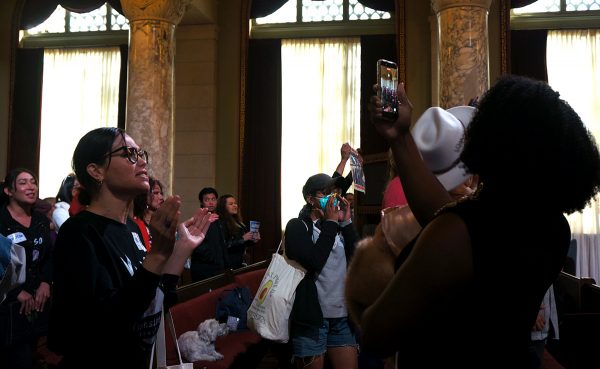
On the quiet walk back onto the street outside, Navarro reflected on the importance of this meeting and the effort community members made to be there. “A lot of the time, not just city council, [but] groups in general tend to forget trans people,” Navarro told the Blade. “Trans people are here. You saw today: clearly, we’re not a small pocket. I think we have to show them: we’re here [and] we’re not going anywhere.”
“It’s not great to be left in a place where you’re expected to continue to do the work, but without any actual support,” Navarro continued. Besides concrete funding, official citywide support for TGI WE would affirm that elected officials are willing to take a stance and take meaningful action when it comes to supporting TGI community members. “So it’s not just the money,” Navarro said. “L.A. has a motto, [that] L.A.’s for everyone. But I don’t know how you can say that when you’re not doing everything in your capacity to protect everyone.”
Kristie Song is a California Local News Fellow placed with the Los Angeles Blade. The California Local News Fellowship is a state-funded initiative to support and strengthen local news reporting. Learn more about it at fellowships.journalism.berkeley.edu/cafellows.
Los Angeles
UCLA’s long-standing LGBTQ+ alumni organization welcomes new president
The Blade sat down with paralegal studies professor and local advocate Bobby Rimas to talk about intersectional leadership and his goals for the UCLA Lambda Alumni Association.

As a young student studying history at UCLA, Bobby Rimas was grounded by his growing desire to give back to his community. He worked as a tutor for low-income students and became invested in learning about the ways intersectionality impacts people’s access to education and resources. “My barriers may not be the same as yours, and your barriers may not be the same as mine,” Rimas told the Blade. “How do you apply that in leadership [and] in the classroom?”
After 15 years of service to UCLA’s various alumni networks, first beginning with the Pilipino Alumni Association, Rimas became president of the university’s Lambda Alumni Association on Jan. 1. The UCLA Lambda Alumni Association was formed in 1989 as a way to support LGBTQ+ students and graduates with professional development, scholarship opportunities, mentorship, and other outreach support.
UCLA has long been a local epicenter of queer activism and advancement. Students formed groups like the Gay Student Union and Lesbian Sisterhood in 1969 and 1973, respectively, to empower and connect queer students. Queer art and culture also thrived in this time, as students saw the launches of the queer campus paper, magazine, and a film festival that centered on LGBTQ+ stories.
Administratively, campus officials were taking a stance against LGBTQ+ discrimination. In 1975, UCLA Chancellor Charles E. Young banned departments and programs from discriminating on the basis of sexual orientation.
In the decades since, leaders like Rimas are working to preserve this history and also build upon it. How can we inspire students in and out of the classroom? How do we make sure they have access to valuable resources and can advocate for themselves in places that are not always inclusive of their needs and identities?
Rimas often ponders these questions, both as president of the Lambda Alumni Association and at Cal State LA, where he works as an associate professor of paralegal studies. There is often cross-pollination in the concerns he receives from alumni members as well as his students: How do they find employers who are accepting of LGBTQ+ people? How do they avoid being discriminated against in the workplace?
These are questions Rimas hopes to tackle more in his role as president of the UCLA Lambda Alumni Association and in his continued tenure as an educator. One of his first goals is to expand the board and bring on more diverse perspectives to the organization. “More people means more activity,” Rimas said, who hopes that the combined knowledge and resources of the board can better serve students and alumni.
Rimas also hopes to throw a large Gala event, one that mirrors the extravagant, celebratory 2019 bash he organized for the association when he was first brought onto the team. 100 people attended, creating a wave of awareness for the organization and increasing their scholarship funding.
What’s next? UCLA Lambda Alumni Association’s first board meeting is this upcoming Monday. Rimas hopes to discuss strategies to grow the organization’s presence beyond the campus’ reach, in other queer cornerstones like West Hollywood, elevating diverse LGBTQ+ voices, and improving ways they can professionally support their network’s members.
Kristie Song is a California Local News Fellow placed with the Los Angeles Blade. The California Local News Fellowship is a state-funded initiative to support and strengthen local news reporting. Learn more about it at fellowships.journalism.berkeley.edu/cafellows.
Los Angeles
South L.A. celebrated Black joy and resistance at yesterday’s Martin Luther King Jr. Day Parade
The Blade also sat with staff from Center South, a community site that champions the safety and health of South L.A.’s LGBTQ+ communities of color.
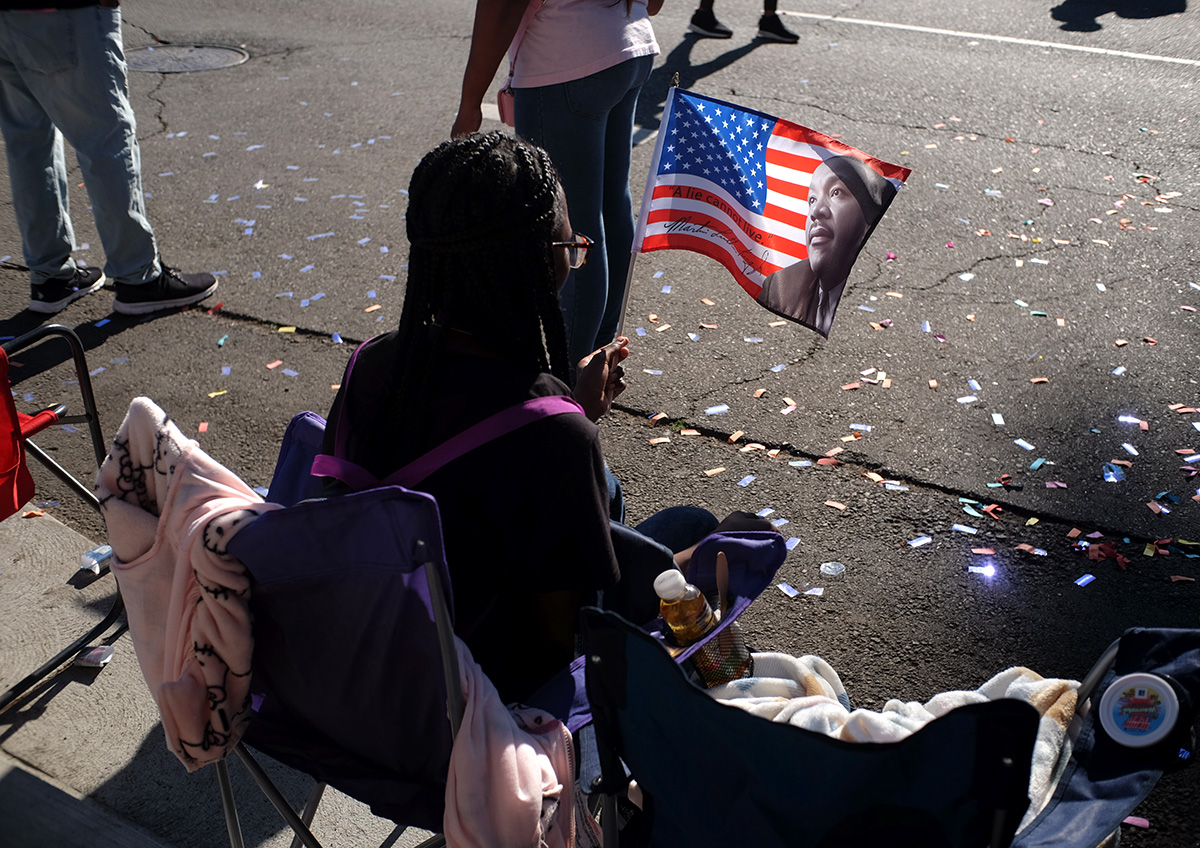
At 9 a.m. on Monday, Jan. 19, South L.A. community members gathered on the streets, holding onto lawn chairs and the hands of their children and family members. “Good morning,” one greeted. “Are you ready for the parade?” Neighbors laughed and hugged underneath the warm morning sun, staring into the horizon in anticipation of the county’s official Martin Luther King Jr. Day Parade, organized by Bakewell Media and the Los Angeles Sentinel Newspaper.
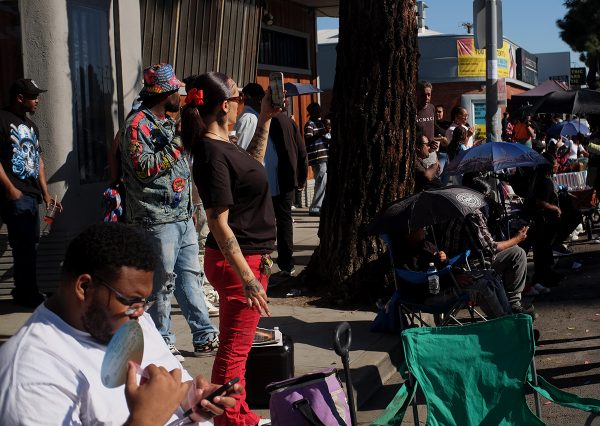
When the parade began an hour later, organizations like labor union SEIU Local 721, civil rights group Black Lives Matter Los Angeles, and HIV care and advocacy nonprofit AIDS Healthcare Foundation marched to cheers and waves from the crowd. Young musicians, drill and cheer teams from Marcus Garvey School and other schools stepped in unison, performing elaborate routines and sending jolting, infectious waves of drum and trumpet like electricity through paradegoers.
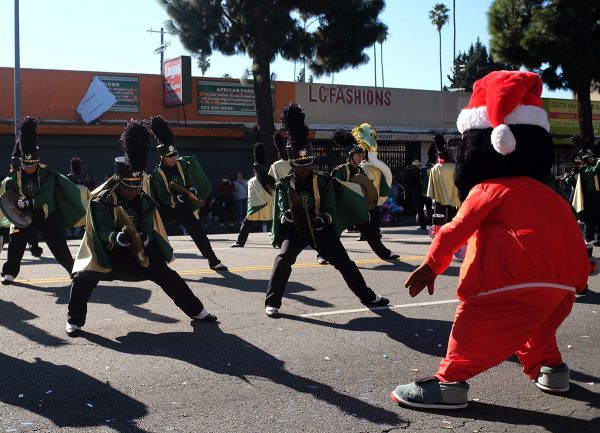
Black liberty and joy coalesced with a call to face injustice at yesterday’s festivities. Black Lives Matter Los Angeles members handed out flyers demanding accountability for Keith Porter, who was killed by an off-duty Immigration and Customs Enforcement (ICE) agent on Dec. 31. Marchers also waved the Iranian flag in solidarity with its people, who have faced increasing state-sanctioned violence after they began protesting the government in the midst of an economic downfall.
Communal care and empowerment remain, for many, the only way forward as trust in broader governmental systems and structures wanes. While celebrating the monumental work of the late civil rights activist, community members yesterday echoed an important, resonant message: The work is not yet done.
This community work is largely supported by local advocates and organizations like Center South: one of the Los Angeles LGBT Center’s community sites. Yesterday morning, ahead of the parade, senior program manager Steven Campa and fellow staff members welcomed people into the space for coffee and pastries.
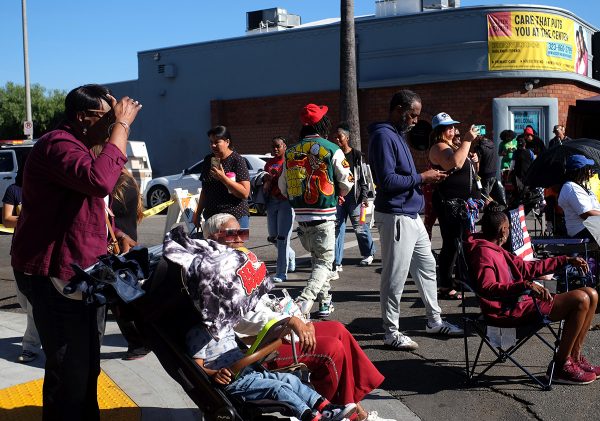
They also handed out flyers introducing residents to the site’s resources, which include: hygiene kits, HIV testing, a free monthly farmers market and clothing closet, mental health and primary care services, substance use and recovery programs, as well as social groups that prioritize LGBTQ+ people of color living in the neighborhood.
Center South opened six years ago, reclaiming a space that once housed a vibrant jazz supper club. At first, the site focused on providing services specifically for men who have sex with men (MSM), regardless of whether or not they identified as a member of the LGBTQ+ community. Over time, Center South became more inclusive of and responsive to the local community as a whole, becoming a safe space for anyone in South L.A. seeking refuge and care.
Campa, who has been with Center South since its founding, emphasized the constantly-evolving nature of the place as it molds itself to best serve and represent its community. Staff members and clinicians are nurtured by their own personal connections to the neighborhood, yearning to give back to the place that raised them.
And that has an effect. “How does it look to have a provider who’s queer: a provider that looks like folks in the community?” Campa said. “We’re our community. Folks grew up [here]…To speak to the MLK Day parade, this was a holiday for the Center. Folks chose to be here. Understanding that we are on MLK Boulevard, we want to continue to do [show up] every year to provide a safe space for the community.”
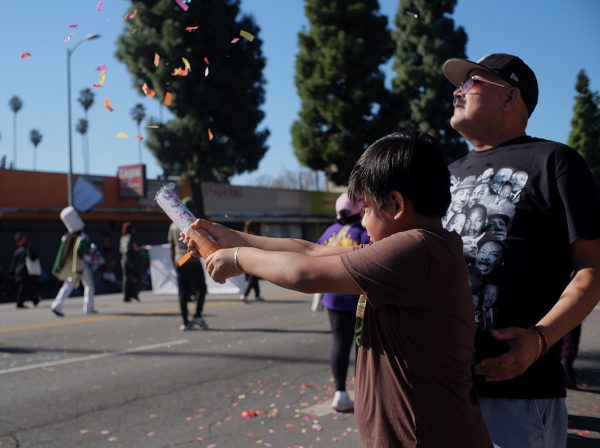
Campa, his staff members, and fellow Los Angeles LGBT Center staff want to expand what it means to be safe and healthy — and to see that reflected more broadly in their communities. “A healthy person needs medical care [and more],” said the Center’s chief equity officer, Giovanna Fischer, who showed up on Monday to celebrate the parade with the community. “[They also] need food access, immigration support…That’s definitely going to impact their health and wellbeing,” Fischer told the Blade. “
Campa, Fischer, and other advocates are strategizing for their community in uncertain times, as threats to instrumental funding are seemingly always on the table. But as they “forecast for the future” and continue to build a collective vision that uplifts LGBTQ+ people of color, their fight endures. “We deserve to think about where we want to go,” Fischer said. “We deserve the opportunity to dream and scheme, and so does our community. So until further notice, we’re going to continue to do that.”
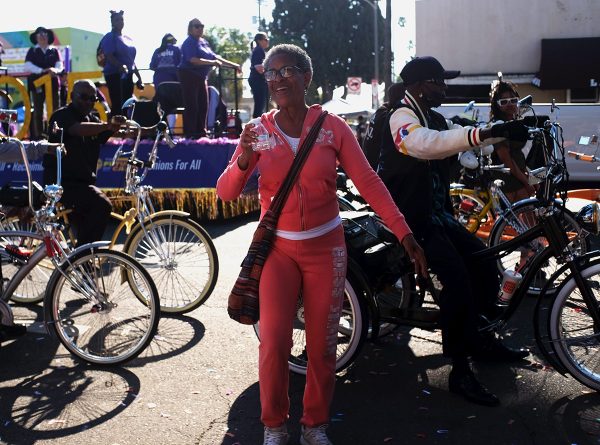
Kristie Song is a California Local News Fellow placed with the Los Angeles Blade. The California Local News Fellowship is a state-funded initiative to support and strengthen local news reporting. Learn more about it at fellowships.journalism.berkeley.edu/cafellows.
Los Angeles
Advocates demand that trans youth be protected as cases are argued in Supreme Court
This week, LGBTQ+ advocates and legal experts spoke in support of trans youth as two Supreme Court cases challenge their rights and safety.

This Tuesday, the Supreme Court heard oral arguments regarding two cases about transgender girls in sports: Little v. Hecox and West Virginia v. B.P.J.
In 2020, Idaho Governor Brad Little signed into law HB 500, which bans transgender girls and women from participating in school sports. This affected the first case’s respondent: transgender student athlete Lindsay Hecox, who was barred from participating in the track and cross country teams as well as intramural soccer and running clubs.
In 2021, then-governor of West Virginia, Jim Justice, approved HB 3293, which enacts a similar ban. Becky Pepper-Jackson (B.P.J.), now an incoming high school student, opposed the discriminatory policy when it prevented her from joining her then-middle school’s cross country and track and field teams. Pepper-Jackson has also only undergone female puberty due to gender-affirming care, but West Virginia argues that its anti-transgender policies should be upheld because of her assigned sex at birth.
For LGBTQ+ advocates and allies, these cases illustrate the burden and harm transgender people face daily as their rights to privacy, dignity, care, and inclusion are constantly at risk of being eroded and stripped completely.
Experts also wonder if these cases could potentially reshape the Constitution’s Equal Protection Clause as well as the civil rights law, Title IX. The former prohibits discrimination on other factors aside from race, though governments have argued that certain “suspect classifications” can be looked at more closely through “heightened scrutiny.” The latter prohibits sex-based discrimination in federally-funded schools.
What is unfolding and how local advocates are informing change:
The fight ahead is weary, and experts are certain that the states involved will not concede their points. In a webinar organized yesterday by the Williams Institute, several LGBTQ+ policy experts, including Rutgers Law School professor and anti-discrimination scholar Katie Eyer, examined where these cases may be heading, as well as efforts to muddy the arguments.
“It seems possible that the court might try to sidestep that issue here by saying that these laws don’t target transgender people at all,” Eyer said. “I think for most people, this seems bananas: like an upside-down world. We all know these laws were about transgender people.”
Jenny Pizer, an attorney for the LGBTQ+ civil rights legal organization Lambda Legal and a co-counsel member for the B.P.J. case, affirmed this sentiment at a press conference organized Tuesday by Lambda Legal and AIDS Healthcare Foundation affinity group, FLUX. “They’ve gone to great lengths to say there’s no discrimination,” Pizer said. “[They’re arguing] it’s just technicalities or classifications.”
Eyer was one of three Equal Protections scholars who filed an amicus brief to be considered in the Supreme Court cases. An amicus brief is a legal document submitted by someone who is not involved directly in a case but who may offer additional perspectives and information that can inform the ruling process.
Eyer’s brief provided historical context that clarified the disadvantages of blanket sex-based policies. These types of laws, according to Eyer, uphold stereotypes over nuance, truth, and equal protection guidelines. For Pepper-Jackson, who has only undergone female puberty and who does not “benefit” from what dissidents define as a sex-based competitive “advantage,” the state should have provided her the ability to argue that she should have the same rights as other girls.
“Of course, the state hasn’t done that here,” Eyer said. “Under these precedents, the Supreme Court should invalidate the laws as applied to those trans girls who really don’t have a sex-based competitive advantage.”
Who are these bills protecting?
The states argue that their policies are merely “ensuring safety and fairness in girls’ sports.” But queer advocates understand that this is a veneer for the exclusion of transgender people from society. Forcing trans youth out of sports “does not protect anyone,” according to California LGBTQ Health and Human Services Network director Dannie Ceseňa, who spoke at Tuesday’s press conference.
“It encourages the scrutiny of children’s bodies. It fuels gender policing, and it creates hostile school environments — not safer ones,” said Ceseňa. “Our youth should not inherit a world that treats their existence as a threat.”
Transgender people are systemically disempowered
At yesterday’s webinar, Distinguished Visiting Scholar at the Williams Institute Andrew Flores discussed his own amicus brief in support of Pepper-Jackson. The brief highlights the need for “heightened judicial scrutiny” in Pepper-Jackson’s case because the majority of political processes “systemically fail” transgender people.
For example, the transgender community faces substantial barriers in exercising their voter rights because of voter identification laws and other policies that regulate and define identity. “Even being able to gain access to the franchise is a burden for transgender people,” Flores said. “The court does play an important role there. It can grant legitimacy to arguments…or at least [acknowledge] that these issues are more complicated than maybe how they’ll receive them.”
What’s next?
Experts are hesitant about where the cases stand. “Bottom line: I don’t know what the court is going to do in these cases. They may send them back down for further development,” Pizer said, who thinks future rulings will not shift more overarching policies regarding transgender rights. “I think they will probably decide based only on laws about sports, not laws more broadly about the rights of trans folks.”
But whatever is decided, the impacts will trickle down to everyone. While the cases deal specifically with anti-transgender policies, experts warn that LGBTQ+ issues have always been tied to racial, economic, and disability justice. “There’s this looming constitutional campaign to really undermine civil rights,” said Eyer. “That affects LGBTQ people. It affects people of color. It affects people with disabilities. It affects everybody, and it really is concerning.”
As transgender inclusion and safety are being argued on the largest legal stage, advocates are asking: “When are you going to step up?” They are also sending a direct message to transgender youth: “We see you, we believe in you, and we are fighting for you,” said Ceseňa. “You deserve joy, community, and care. You deserve a future that reflects who you are and not who anyone or any politician demands you to be. Trans youth deserve better.”
Kristie Song is a California Local News Fellow placed with the Los Angeles Blade. The California Local News Fellowship is a state-funded initiative to support and strengthen local news reporting. Learn more about it at fellowships.journalism.berkeley.edu/cafellows.
Los Angeles
AIDS Healthcare Foundation will celebrate its legacy of food relief at the New Year’s Rose Parade
This Thursday, AHF will march at the Rose Parade in celebration of its “Food for Health” program: an initiative that has fed community members in need for five years.

This Thursday, the AIDS Healthcare Foundation (AHF) will march in the highly-anticipated Rose Parade in Pasadena. AHF will present a Jack and the Beanstalk float with the titular character climbing amongst ginormous tomatoes, eggplants, strawberries, and tomato plants. It’s befitting of this year’s parade theme: “The Magic in Teamwork,” which celebrates the power of collective effort and unity.
The whimsical design also honors the organization’s “Food for Health” program, an initiative that began in 2021 to respond to food insecurity across the U.S. For nearly five years, “Food for Health” has hosted free food pantries and farmers’ markets, providing hot meals and fresh groceries nationally for families and veterans in need of food assistance.
“Food for Health” was also crucial in the wide-sweeping emergency response various nonprofits were trying to organize after the devastating Palisades and Eaton Fires in January. AHF’s program delivered over 75,000 hot meals to evacuees and Los Angeles Fire Department (LAFD) first responders.
The float also honors the individuals fueling these on-the-ground efforts, like Janet and Christy Lee, the sisters behind Altadena’s Fair Oaks Burger. For eight months after these major fires broke out, the Lee sisters worked closely with “Food for Health” to host free weekly farmers’ markets in the parking lot of their restaurant to support community members who had been displaced and impacted by the wildfires.
Both sisters will join fellow local advocates and leaders like labor activist Dolores Huerta, LAFD Captain Thomas ‘Kit’ Kitahata, Champions of Caring Connections executive director Bettye Randle, and “Food for Health” directors Carlos Marroquin and Tara O’Callaghan as riders on the AHF float.
The Rose Parade begins at 8 a.m. on Thursday morning, marching through 5 miles of Colorado Blvd. Now in its 137th year, the parade’s inaugural event was held in 1890 and continues to delight local residents and usher in the new year with illustrious musical performances and grand floats. More information about tickets and parade guidelines can be found on Pasadena’s Tournament of Roses website.
Kristie Song is a California Local News Fellow placed with the Los Angeles Blade. The California Local News Fellowship is a state-funded initiative to support and strengthen local news reporting. Learn more about it at fellowships.journalism.berkeley.edu/cafellows.
Los Angeles
Recent L.A. County report reveals record number of hate crimes against transgender and nonbinary community members
The county’s Commission on Human Relations (LACCHR) released its annual hate crime analysis, revealing a rising violence against LGBTQ+ Angelinos.

Last Thursday, Los Angeles County’s Commission on Human Relations (LACCHR) released its 2024 Hate Crime Report, which analyzes data compiled from over 100 reporting groups, including local law enforcement agencies, educational institutions, and community-based organizations like the TransLatin@ Coalition. In its 45-year history of compiling these reports, the LACCHR recorded an “unprecedented” amount of hate crimes in this most recent analysis.
The report states that there were 102 anti-transgender crimes, “the largest number ever documented in this report.” 95% of these reported incidents were violent.
Part of the reason for this increase in reported crimes is the expanding outreach LACCHR is trying to create with partner organizations, ensuring that queer community members feel increasingly safe in reporting crimes that have been committed against them. These “grassroots efforts” have proven invaluable in building community trust, according to Dr. Monica Lomeli, who leads the production of LACCHR’s annual hate crime report.
“For the LGBTQ community, [there’s] a history of not being heard, not being believed or being misgendered,” Lomeli told the Blade. “I remember us working with a lot of different law enforcement agencies [and] victims would tell us: ‘They keep misgendering me. They don’t believe me. They keep having me make different reports.”
Lomeli stresses that, for those who feel unsafe reporting hate crimes to law enforcement agents, there are other options. One of these pathways is the commission’s community-centered initiative and reporting system, LA vs Hate, which allows people to report hate crimes and access resources like multilingual reporting guides. There is also 211 LA, a program funded by the commission that provides free, confidential support in 140 languages.
The report is instrumental to the formation of initiatives focused on queer safety and is also a resource to various LGBTQ+ organizations as they track violence committed against their community members. But the collection of this data has not been smooth, especially in this current administration.
Lomeli explained that, earlier this year, the now-defunct Department of Government Efficiency (DOGE) reached out to various human rights organizations, including the LACCHR, and was aiming to gain access to and shut down the commission’s hate crime database. “There was an attempt to bring down our data,” said Lomeli, who described these attempts as an infringement on the general public’s ability to access the report’s findings.
Moving forward, the commission’s Network Against Hate Crime, which hosts quarterly meetings with leaders from law enforcement agencies, advocacy groups, educational institutions, and social services providers, will hold a briefing on the report and discuss collaborative solutions to support community members.
Lomeli hopes to bring LGBTQ+ issues to the “forefront” of one of these upcoming meetings, given the high number of hate crimes committed against queer community members that were highlighted in the report. LA vs Hate will also continue to host campaigns, marketing efforts, and awareness events to promote the equitable treatment and safe existence of queer and other marginalized Angelinos.
Kristie Song is a California Local News Fellow placed with the Los Angeles Blade. The California Local News Fellowship is a state-funded initiative to support and strengthen local news reporting. Learn more about it at fellowships.journalism.berkeley.edu/cafellows.
-

 Arts & Entertainment4 days ago
Arts & Entertainment4 days ago2026 Best of LGBTQ LA Finalist Voting
-

 Commentary4 days ago
Commentary4 days agoWhen optics matter more than harm: BAFTA, BBC, and editing solidarity while letting slurs slide on through
-

 California4 days ago
California4 days agoExperts discuss pathways forward as anti-trans violence continues to rise
-

 a&e features4 days ago
a&e features4 days agoRevry Co-Founder Damian Pelliccione on why we need ‘King of Drag’
-

 LGBTQ+ Youth Mental Health2 days ago
LGBTQ+ Youth Mental Health2 days agoFor queer youth, LGBTQ+ scholarships affirm their visibility and sense of possibility
-

 Books4 days ago
Books4 days agoNew book profiles LGBTQ+ Ukrainians, documents war experiences
-

 Books3 days ago
Books3 days agoThe social side of self-pleasure: Artist Jason Wimberly presents his newest book of photography, HOMOSOCIAL
-

 Obituary2 days ago
Obituary2 days agoAppreciating literature’s gay genius, Michael Silverblatt
-

 Movies2 days ago
Movies2 days agoMoving doc ‘Come See Me’ is more than Oscar worthy
-

 a&e features1 day ago
a&e features1 day agoTaylor Tookes wants you to be your own beauty standard

